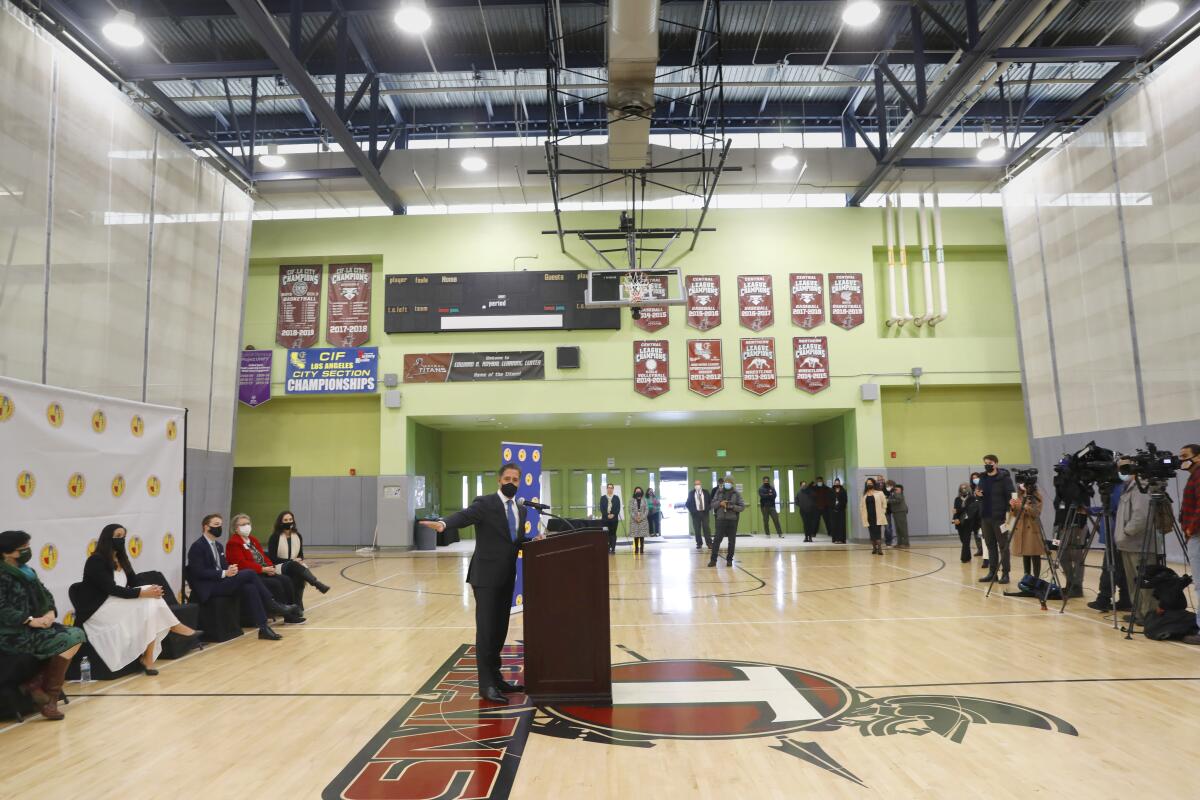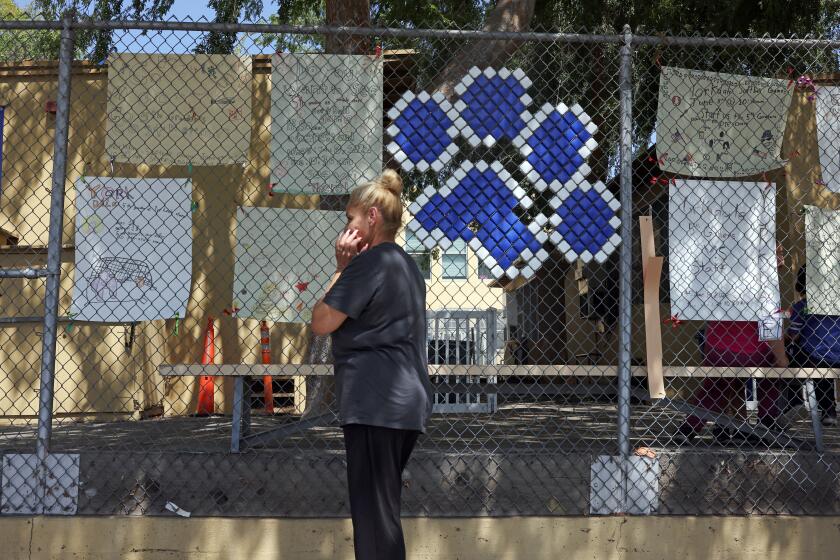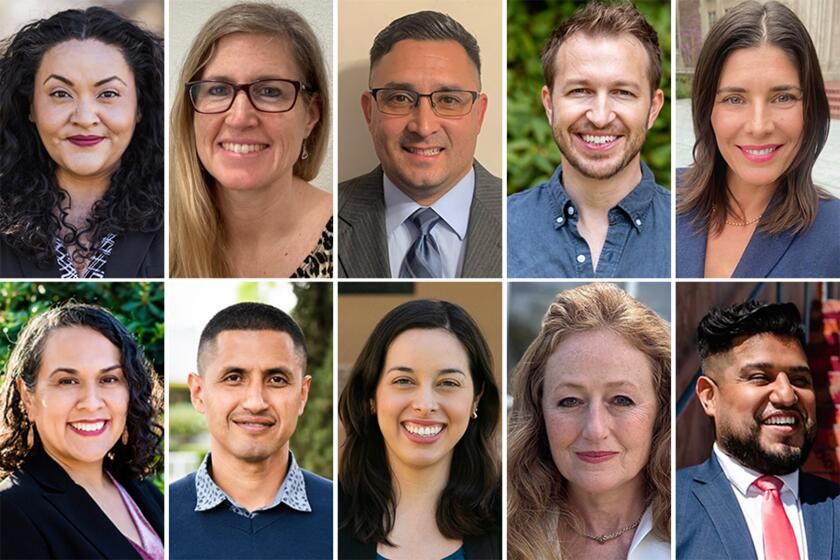L.A. school board races like no other in recent memory: less spending, little mudslinging

There hasn’t been a school board election quite like this in Los Angeles Unified in more than a decade — no record spending, much less mudslinging — and no deluge of campaign mailers with candidates backed by the teachers union facing off against those backed by charter school advocates or a city mayor.
Still, there’s a lot at stake leading up to the June 7 primary for three board seats: Topmost is overseeing the academic and emotional recovery of students from the COVID-19 pandemic. And that will mean getting the most out of record-high, short-term funding. The seven-member governing board also must navigate rapidly dropping enrollment, which could lead to school closures and worsen potentially serious long-term financial stress.
The two incumbents, Kelly Gonez and Nick Melvoin, face no well-funded challenge, even though the teachers union spent millions to oppose their first bids for office in 2017. This time the teachers union is endorsing Gonez and silently conceding to Melvoin.
The most competitive race is for the open seat in District 2 — which covers downtown and stretches north and east to include Los Feliz, Highland Park, Boyle Heights, El Sereno and East L.A. Four candidates are vying for the seat of termed-out school board member Monica Garcia: Maria Brenes, a longtime nonprofit director on the Eastside; Rocio Rivas, a senior aide to board member Jackie Goldberg; Erica Vilardi-Espinosa, a finance officer and school volunteer; and Miguel Ángel Segura, a district substitute teacher.
Major special-interest groups are split among three of the candidates. United Teachers Los Angeles is backing Rivas. Local 99 of Service Employees International Union, the largest union for non-teaching employees, is supporting Brenes, as are charter school advocates. Unions representing public safety officers have endorsed Vilardi-Espinosa.
Charter school supporters have not yet launched their familiar mega-funded, hard-knuckle independent campaign of past races. Instead, the two largest employees unions — UTLA and Local 99 — are pouring in the major money in District 2.
Two years ago, independent spending on school board races leading into the primary reached about $8.5 million. In the current cycle, independent spending is about $2.85 million, although that’s still an enormous sum for anywhere outside Los Angeles.
Part of the explanation for the lower-key races might be that the major forces behind candidates faced a common enemy for the last two years: the pandemic. The crisis resulted in increased cooperation, a suspension of hostilities and an aftermath of lingering civic exhaustion, said Fernando Guerra, director of the Loyola Marymount University Center for the Study of Los Angeles.
UCLA education professor John Rogers suggested that a corner has been turned, partly by circumstance and partly by a decline of support for charters among some leading Democrats in a Democrat-dominated region.
“We have entered a Pax Los Angeles characterized by new shared concerns with addressing the great needs created by the pandemic,” Rogers said. “There is much work ahead for the next board, but it need not be as divisive and destructive as in recent years.”
All the candidates emphasize a need for an intense focus on academic recovery. Nearly all also want at least as intense a focus on student mental health. There’s also broad support for “community schools,” which offer a range of help to families and a voice for parents and students. And, collectively, there appears to be no enthusiasm for increasing the number of charter schools — albeit with subtle differences.
There are, however, notable distinctions when it comes to vaccine mandates and accelerating cuts to school police — the candidates answered questions on this topic before the deadly school shooting in Uvalde, Texas.
The school board, including Gonez and Melvoin, has enforced a vaccine mandate for employees, while postponing enforcement of an earlier mandate for students 12 and older.
Melvoin and Gonez favored a first round of $25 million in cuts to the school police department, but said they are reluctant to cut further for the moment. Brenes said she wants to “uplift” the voices of student activists who favor abolishing school police; Rivas wants to bring the community together over the matter. The other candidates explicitly support having school police — either moderately or strongly.
No candidate has outright opposed the merit of the 20% raise that teachers are asking for, although some question its affordability. Melvoin said the district simply can’t afford 20%; Gonez said she hasn’t yet “run the numbers.”
Parents are demanding answers on safety after Texas school shooting. Here’s what California is doing.
District 2
Brenes, 45, is the longtime leader of InnerCity Struggle, a student advocacy and family services group that operates out of Boyle Heights. Rivas, 48, conducts research, develops policy and works as a community liaison for school board member Jackie Goldberg, a labor ally. Vilardi-Espinosa, 46, who has worked as an entertainment industry accountant and chief financial officer for a small firm, has held leadership roles in local schools and the neighborhood council. In addition to teaching, Segura, 36, has worked as a logistics specialist for political campaigns.
Brenes, Rivas and Vilardi-Espinosa all are parents with one or more children currently in district schools. No board member in recent times has had a child in an L.A. public school, although Gonez has one that is about to enter an early education program.
Brenes is the candidate who identifies most closely with Garcia, although she’d like to nurture better ties to teachers. Garcia and Brenes worked together for years to identify and pursue priorities at Eastside schools. This included requiring all district students to graduate qualified for admission to a four-year state college. The policy ultimately was scaled back because students were not hitting the mark, although having the target probably resulted in more students completing the necessary coursework.
Among all the candidates, Rivas — whose varied career in education-related fields included work overseeing charters — embodies the strongest anti-charter sentiment. Rivas also is the candidate most critical of Garcia — who has been a steady supporter of charters.
In 2019, Rivas was among a large group that ran for the open school board seat in District 5. After Goldberg won that race, Rivas began working for Goldberg.
Vilardi-Espinosa has views that align closely with the teachers union, but differs with union leaders in her support of school police. She said that, since cuts were made to the police department, response times to schools have extended considerably, making campuses feel less protected.
Segura, a former student body president at Belmont High, notes he’s the one person in the District 2 field with teaching experience. In addition to his current subbing, he taught for about four years in local schools shortly after graduating from college.
Mini-profiles of candidates on the ballot to lead the nation’s second-largest school system.
Districts 4 and 6
In their bids for reelection, Gonez, 33, and Melvoin, 36, each stress their stewardship of the district through the pandemic, their push for improved academic opportunities and better mental health supports.
All of those were selling points for retired businessman Bill Bloomfield, who once again is spending big in a school board race and has set aside more than $2 million for an independent campaign on behalf of Melvoin, Gonez and Brenes, whom Bloomfield said he views as the person who would best continue Garcia’s work. The vast majority of his funding has gone to a campaign on behalf of Melvoin.
This includes a negative campaign against Melvoin’s two challengers, teacher Tracey Schroeder and parent Gentille Barkhordarian.
The teachers union’s evolving stances on the two incumbents signals that the union “has learned that it can work with Melvoin and Gonez and therefore doesn’t see the need to back an opponent,” speculated Pedro Noguera, dean of the USC Rossier School of Education.
Melvoin and Gonez each were instrumental in the recent hiring of Supt. Alberto Carvalho, while Melvoin was more central in the hiring of previous Supt. Austin Beutner. During the height of the pandemic, both board members stepped back and let Beutner make major decisions. These actions put the district at the national forefront on safety measures, such as weekly coronavirus testing, and in close alignment with the teachers union. Critics said the results overlooked student needs for more services, a longer school day and a quicker reopening of campuses.
Both have favored pushing more resources to schools with the neediest students, even at the potential expense of schools with more middle-class students.
Gonez, who was elected school board president by her colleagues, represents District 6, which covers most of the east San Fernando Valley.
Her opponents, Jess Arana and Marvin Rodriguez — both district parents — align with her politically on many issues. Both are pro-vaccine, although Arana would not mandate it for either students or employees; Rodriguez supports the employee mandate.
Arana, 44, a district police sergeant who has filed for retirement, takes issue with cuts to the police department, although, like other pro-school-police candidates, he emphasizes that security needs must not come at the expense of counseling.
Get the lowdown on L.A. politics
Sign up for our L.A. City Hall newsletter to get weekly insights, scoops and analysis.
You may occasionally receive promotional content from the Los Angeles Times.
The other challenger, Marvin Rodriguez, 42, drives with his daughter every day to Cleveland High, where she’s a student and he’s a Spanish teacher with 17 years of experience. He also has a younger child in a district school. Like Arana, he’s a military veteran. His experience, he said, gives him the courage to make difficult decisions on behalf of students.
Melvoin represents District 4, which stretches westward to the coast from Hollywood and Hancock Park and north into a portion of the west San Fernando Valley.
His two challengers are Barkhordarian, 56, and Schroeder, 48. Both oppose any COVID-19 vaccine mandate.
Schroeder has been an L.A. Unified elementary school teacher since 1998 and stresses her experience, her independence and love for her job.
Barkhordarian, a parent of two with an engineering background, said her experience as a business consultant, language skills and immigrant background provide a solid basis for board service. She opposes the cuts to school police. Recovering from learning loss and staffing shortages comes down to strengthening parent involvement, she said.
More to Read
Sign up for Essential California
The most important California stories and recommendations in your inbox every morning.
You may occasionally receive promotional content from the Los Angeles Times.













